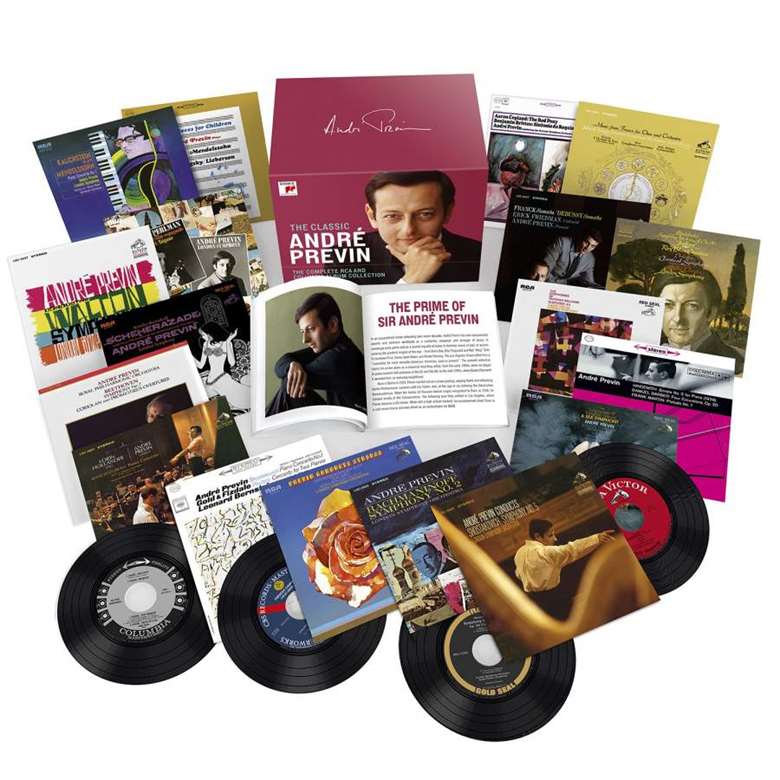André Previn: the classic recordings
Rob Cowan
Thursday, February 28, 2019
Rob Cowan explores a new bumper box-set of Previn as conductor, composer and pianist

We reprint this review from the February 2019 issue in tribute to André Previn, who has died at the age of 89.
The best of this celebratory collection is pretty well in a class of its own and so it might be useful to focus on some highlights. A disc of French chamber music includes a vivacious account of Saint-Saëns’s trumpet Septet (try the opening of the finale), whereas André Previn’s playing of the second subject in the first movement of Poulenc’s Sextet (at 2'13") is the sort of elevated ‘cool’ that makes him the stuff of legend in the jazz world. Gershwin is represented by a classic coupling of the Piano Concerto and Rhapsody in Blue where Previn is idiomatically supported by André Kostelanetz and his Orchestra, performances that suggest more of Tin Pan Alley than Previn’s rather more urbane remakes with the LSO.
I’d not previously encountered a coupling of piano trios by Mendelssohn (No 1) and Fauré with two superb string players, the violinist Feri Roth (leader of the Roth Quartet) and cellist Joseph Schuster, music-making in the Heifetz/Piatigorsky class: alert, intelligently phrased and sweetly expressive. And there’s the English symphonic fare, notably Walton’s First Symphony, a performance in a million, the gifted American here hell-bent on proving how, given dedication and hard work, a non-Brit could pip any local to the post, including the composer himself. The drive of the first movement, the nervous energy of the second, the slow movement’s emotional candour and the finale’s exuberance all find Previn and his London Symphony players on top form. I’m not saying it’s the only way to perform the work, but as a first stop, it’ll win any newcomer over to the piece, no question.
The Vaughan Williams symphony cycle is in general a triumph. Previn’s insistence that this music must be ‘left alone and will make its point by itself’ is more or less in line with the attitudes of Andrew Davis, Boult and Handley, though I could have done with more overt rage in Symphonies Nos 4 and 6: Mitropoulos, Bernstein and Vaughan Williams himself in the former and Boult, Stokowski and Barbirolli (in Munich) in the latter hit the target more securely. My personal favourites in this particular series are Symphonies Nos 2, 3, 5, 7 and 8.
Rachmaninov’s Second and Third Symphonies with the LSO make for interesting comparisons with their EMI/ Warner Classics successors featuring the same artists. Put on the beginning of the Third’s finale and there’s no contest: this earlier version wins hands down for tautness and lacerating attack. Comparisons with the later Warner version of the Second are complicated by the presence of cuts in this 1966 recording: the Warner option was the first of the complete score. Interesting too, comparisons between the two Kingsway Hall tapings, this newly reissued recording offering less amplitude at the lower end of the spectrum than its richer-toned successor.
Other Russian repertory includes an extremely well-focused Shostakovich Fifth and a good Tchaikovsky Second except that there’s a whopping great edit as the outer section of the Scherzo shifts into the trio (at 2'33"). I greatly enjoyed Previn’s genial account of Nielsen’s First Symphony, which combines fresh playing with a welcome refusal to drive the music too hard. As for Beethoven, there’s a fine complete cycle of the piano concertos with Emanuel Ax, at its best in the First Concerto, where the slow movement spins a dreamy narrative and the sprightly finale has real sparkle. The Beethoven symphony cycle omits Symphonies Nos 1-3, picking up with a lyrically stated account of the Fourth. Beyond that, probably best is a well-built Eighth, and a Choral that features a dramatic central conflagration in the first movement and a bouncy Scherzo.
Trawling through the set I can happily confirm that there aren’t many duds. I’d say that the Arthur Gold and Robert Fizdale version of Poulenc’s Two Piano Concerto under Leonard Bernstein doesn’t compare with the best versions that have appeared since, but then it isn’t strictly part of the set, just an ‘original’ coupling that’s offered as a sort of bonus. Regarding ‘Right as Rain’, a miscellany of songs hovering around the theme of The Great American Songbook with Leontyne Price and some distinguished instrumentalists, I can’t say I was too enamoured with ‘Falling in love again’, where Price sounds as if she’s having trouble darkening her timbre in imitation of Marlene Dietrich. Elsewhere she’s idiomatic and in wonderful voice, virtually never suggesting a diva who is stooping to conquer.
Of course there’s plenty more besides, a plethora of varied repertoire in fact, solo, chamber and orchestral, including some of Previn’s own music. Transfers are in general good though some of the quieter music in the Vaughan Williams cycle sounds excessively processed. Still, this set gave me considerable pleasure, confirming as it does the extent of Previn’s immense achievement, a real boon to musical life worldwide, and most especially within these shores. Yours for about £115.







